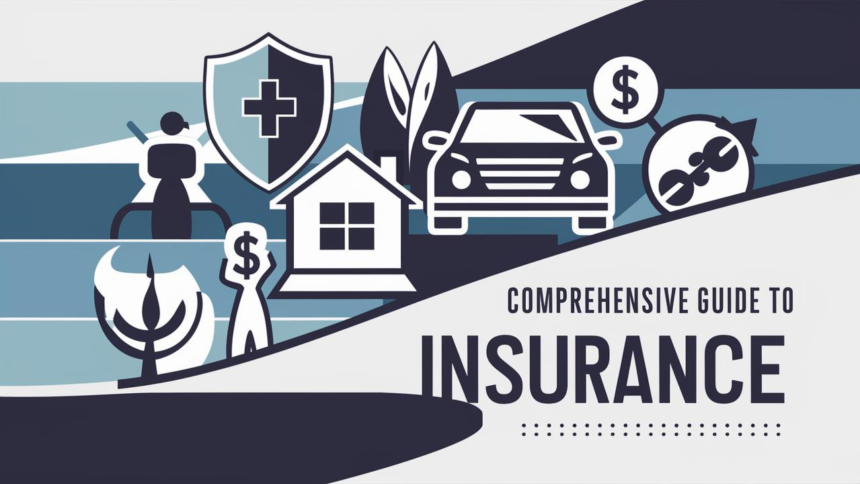Insurance is an essential aspect of financial planning, providing a safety net against unforeseen events. This blog aims to provide a comprehensive guide to insurance, covering its various types, benefits, and how to choose the right policy.
Introduction to Insurance
Insurance is a contract between an individual or entity and an insurance company, where the insurer agrees to provide financial protection against specific risks in exchange for regular premium payments. The primary purpose of insurance is to mitigate the financial impact of unexpected events such as accidents, illnesses, natural disasters, or death.
Types of Insurance
Life Insurance
Life insurance provides financial support to the beneficiaries of the insured in the event of their death. It helps cover expenses like funeral costs, debts, and living expenses for dependents. There are two main types of life insurance:
- Term Life Insurance: Provides coverage for a specific period, such as 10, 20, or 30 years.
- Whole Life Insurance: Offers lifelong coverage and includes an investment component known as cash value.
Health Insurance
Health insurance covers medical expenses incurred due to illnesses or injuries. It can include coverage for doctor visits, hospital stays, surgeries, medications, and preventive care. Health insurance plans can be provided by employers, purchased individually, or available through government programs.
Auto Insurance
Auto insurance protects against financial loss due to accidents involving vehicles. It typically includes coverage for:
- Liability: Covers damages to others’ property and medical expenses.
- Collision: Pays for damages to your vehicle from a collision.
- Comprehensive: Covers non-collision-related damages such as theft, fire, or natural disasters.
Home Insurance
Home insurance provides financial protection for your home and personal belongings against risks such as fire, theft, and natural disasters. It can also cover liability for accidents that occur on your property. Home insurance policies often include:
- Dwelling Coverage: Protects the structure of your home.
- Personal Property Coverage: Covers personal belongings inside the home.
- Liability Coverage: Protects against legal claims for injuries or damages.
Disability Insurance
Disability insurance offers income replacement if you become unable to work due to a disability. It ensures that you can maintain your standard of living and cover essential expenses even if you are unable to earn an income. There are two main types of disability insurance:
- Short-Term Disability: Provides coverage for a few months to a year.
- Long-Term Disability: Offers coverage for several years or until retirement.
Expanded Benefits of Insurance
Insurance offers numerous advantages that extend beyond the obvious financial protection. Here’s a more detailed exploration of the key benefits:
Financial Protection
Insurance acts as a financial buffer, helping to cover the costs of unexpected events such as accidents, illnesses, or natural disasters. This protection is crucial in preventing significant financial setbacks that can arise from high medical bills, repair costs, or loss of income. By paying a relatively small premium, policyholders can avoid the potentially devastating financial consequences of unforeseen events.
Peace of Mind
The peace of mind that comes with being insured cannot be overstated. Knowing that you have a safety net in place allows you to live more freely and confidently. Whether it’s health insurance that ensures you can receive necessary medical care or auto insurance that covers potential accidents, the assurance that you’re protected against life’s uncertainties reduces stress and anxiety.
Asset Protection
Insurance policies are designed to protect your valuable assets. For instance:
- Home Insurance: Covers damage to your home from incidents like fires, storms, or theft. This ensures that you don’t bear the full financial burden of repairs or rebuilding.
- Auto Insurance: Protects your vehicle, one of your most significant investments, against damages from accidents, theft, or natural disasters.
- Personal Property Insurance: Covers personal belongings such as electronics, jewelry, and furniture against loss or damage.
Legal Compliance
Certain types of insurance, such as auto insurance, are legally mandated. Compliance with these laws is not only a legal obligation but also a financial safeguard. For example, driving without auto insurance can result in hefty fines, license suspension, and personal liability for any damages or injuries caused in an accident.
Support for Loved Ones
Life and health insurance policies provide essential financial support to your family during difficult times:
- Life Insurance: Ensures that your beneficiaries receive financial support to cover living expenses, debts, and other financial needs after your death.
- Health Insurance: Reduces the financial burden of medical expenses, ensuring that your family can access necessary healthcare without depleting savings or going into debt.
Income Replacement
Disability insurance provides income replacement if you are unable to work due to an illness or injury. This is crucial for maintaining your standard of living and covering essential expenses when you’re not earning an income. This type of coverage is especially important for those who do not have substantial savings or alternative income sources.
Business Continuity
For business owners, insurance is vital for protecting the business against various risks. Business insurance can cover property damage, liability claims, and even business interruption losses. This ensures that the business can continue operations or recover quickly after an unexpected event, safeguarding employees’ jobs and the owner’s investment.
Risk Management
Insurance plays a critical role in overall risk management strategies. By transferring the financial risk of significant losses to an insurance company, individuals and businesses can plan and invest with greater confidence. This allows for better allocation of resources and more robust financial planning.
Enhanced Creditworthiness
Having adequate insurance can improve your creditworthiness. Lenders and financial institutions often view insurance coverage as a sign of financial responsibility. This can enhance your ability to secure loans, mortgages, and other forms of credit, often at more favorable terms.
Legal Defense
Many insurance policies include provisions for legal defense costs. For instance, liability insurance can cover legal fees if you are sued for damages or injuries caused by your actions. This can save you from significant out-of-pocket expenses associated with legal battles.
Customized Coverage
Insurance policies can be tailored to meet specific needs. Whether it’s adding riders to a life insurance policy for critical illness coverage or customizing a home insurance policy to include high-value items, the flexibility of insurance allows you to build a protection plan that fits your unique requirements.
How to Choose the Right Insurance Policy
Selecting the right insurance policy involves several steps:
- Assess Your Needs: Determine what types of coverage you need based on your life circumstances and financial situation.
- Research and Compare: Look at different insurance providers and compare their policies, premiums, and benefits.
- Consider Your Budget: Ensure that the premiums fit within your budget without compromising your financial stability.
- Read the Fine Print: Understand the terms and conditions, including exclusions and limitations of the policy.
- Seek Professional Advice: Consult with an insurance advisor or broker to get personalized recommendations.
Conclusion
Insurance is a crucial component of financial planning, offering protection and peace of mind against various risks. By understanding the different types of insurance and their benefits, you can make informed decisions to safeguard your financial future. Whether it’s life, health, auto, home, or disability insurance, choosing the right policy ensures that you and your loved ones are well-protected.
This guide provides a solid foundation to understand the basics of insurance. For personalized advice and detailed policy information, consider consulting with a professional insurance advisor.




